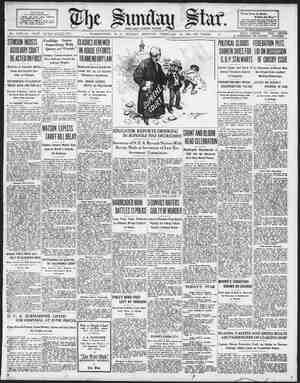Evening Star Newspaper, February 16, 1930, Page 93
You have reached the hourly page view limit. Unlock higher limit to our entire archive!
Subscribers enjoy higher page view limit, downloads, and exclusive features.
receive visitors in the ante-room, and present both ladies and gentlemen, the boy being lty}gd : prince, and His"mothef doing’ the honors; “She then thought, no” doubt, that Bonaparte - to be created "Duchess of Oldenburgh.” It is not improbable that he might have entettained some such vague intention, at that time, of making useé of the bey in Hhis Spanish -~ trigues, from seeing him, as it were, ‘made to his hand on the American continent; or, as he was then in the zenith of his glory, and intoxicatéd with the prospect of destroying all opposition to his power in the Old World, may he not, in conformity with his well known enough the United States, where there are, at all times, plenty of young adventurers ready to set law. at defiance and to invade their neighbors’ rights, careless of the consequences? What is certain is that I have been assured the popu- lace applauded most vociferously when Mme. -Bonaparte appeared for the first time at the Baron Alexander de Bodisco, the Russian Minister to the United States, and who lived at 3322 O street, is best known through his mar- about the whole scene which imparted the character rather of a religious than a festive ocession. “As the appdinted hour approached, most of the members of the diplomatic corps and their families arrived in simple morning costume, and mingled-with the throng, without regard to place or precedence. A party from the Execu- tive Mansion, including Miss Macalister of Philadelphia, Miss Buchanan and Mr. James Buchanon, jr., next came; and soon after, the appearance of Miss Lane at the door indi- cated that she who was to be ‘the observed of all observers’ must be near at hand. Imme- diately the President entered with the Countess Bodisco leaning on his arm, while the whole congregation arose. They passed down the aisle to their places on the left of the chancel, where they were. met by Capt. Secott, who shook hands cordially with the President, and the ceremony was begun at once by the offi- ciating clergyman., There were neither brides~ maids nor groomsmen, and the whole affair had- an air of unusual simplicity.” 5 Hl: adds: “I remember the countess when she was a schoolgirl in Georgetown—the sweet and lovely Harriet Williams, the favorite queen of every Mayday. Her father, & worthy merchant of that ancient and respectable burgh, gave her every advantage of education: but she was as simple, artless and unaffected as the daughter of an humble citizen could be. Her personal loveliness was something rich and rare when the sixteenth Summer shone on her bright eyes. Her form was a model for a sculptor, 30 delicate and roundly dream of beauty seldom realized on earth. “mcmmtnodheonrnuwhermhpr school companions and was at once conquered. He was old, but in excellent preservation, and when made up—as he always was whenever he REF fs g ‘represented being England, France, Se. Ann’s Infant Asylum, Twenty-third and K streets, the British lega tion during the service of Henry S. Fox, 1836-1846, and John T. Crampton 1846 to 1850, British Mini.uen.‘ jonable, but in all well-bred circles. His good- nature and intelligence commended him alse to eminent men of all political parties. “One of his earliest and kindest friends was Henry Clay, for whose talents and geniality he. had an unbounded admiration. -Indeed, he loved that great statesman and orator to s degree rather uncommon .men. But there was really a strong tincture of romantic sensibility about the excellent old count. He was fond of simple pleasures and pure and innocent enjoyments. The attachment of chil- dren to him was extraordinary, and could only have been conciliated by that genuine benevo- § 1812-1815, Charles Bagot, Vis- atford de Redcliffe, taking his place 16 and continuing here until 1819. At inning of Mr. Bagot's service here there but seven members of the diplomatic corps with the rank of Minister, the countries Spain, weden, Denmark, Portugal and Russia. During the early part of 1814 The Octagon, it { g at. Seventeenth street and New York avenue, d'affaires, M. le Comte de here in 1822. ' . Sir Charles also later resided.in the Decatur . House, at the soutlwest corner of H R i 3 , o 2, e Bl modern. The origingl building was erected th 1820 by Capt. J. L. Kuhn, paymaster of the Cemetery. 2 British Minist>r Richard Pakenham, who followed Henry Fox in office, resided in the was also the British legation when occupied by Lord Napier in 1858 and by Lord Lyons dur-- ot It RH{ this city are no doubt quite well known, and will be passed by, at least until some futwré occasion. x In the writer's story on Ninth and P streets, three weeks ago, he mentioned the Rev. Josephy T. §elly of the Fourth Presbyterian Church as having in his early days served that church ag sexton, which is an error. The city directories of 1860-and 1862 in listing the churches show that “Joseph Kelly” was'the janitor of this church and resided at 361 Eighth street northe west, and upon following up this name we find the later directories give it as “Joseph F. Kelley,” and occupation “collector,” and evie dently he was a progressive sort of a fellow, for the 1866 directory gives him as a “real estate broker, general agent and notary.” The Rev. Mr. Kelly’s full name is Joseph T. Kelly, and the similarity of names caused the confusion, Paper Making in japan.‘ APANhnpldlyhkln;lhphoemm paper-making nations, particularly in the news print field. uniimi ted water-power supply, she ig has rapidly forged to the frorit progressive and modern’activities of the ' W M . empire, and bids fair to'be évén moré produd- With her huge forests and
